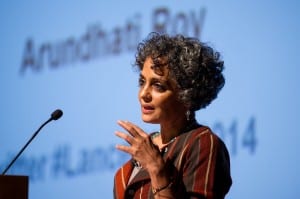The 2014 Lancet Lecture – The half-life of caste: The ill-health of a nation
By Kilian Thayaparan, on 26 November 2014

Arundhati Roy speaking at the 2014 Lancet Lecture.
Credit: Kirsten Holst.
More than 700 people were in attendance for the 2014 Lancet Lecture, this year given by acclaimed novelist and political activist Arundhati Roy.
The Institute of Education’s Logan Hall – this year’s host venue – was already reaching near full capacity when I arrived. There was a sense of anticipation and excitement, with attendees moving from one area of the room to another as they attempted to find the best possible vantage point.
Considering Roy’s numerous notable achievements and accomplishments, it’s easy to see why this particular Lancet Lecture had generated so much interest – in 1997, she won the Booker Prize for Fiction with her novel The God of Small Things, and she has since written several political pieces on issues ranging from large dams to nuclear weapons.
For the 2014 Lancet Lecture, Roy focused on the practice of caste in India and how it received support from many of those who led India’s struggle for independence. Her comments in the past have gained unfavourable attention in India, often opinionated and controversial, and Roy’s talk on caste would be no different; “If these things shock and disturb you, all I can say is that they shocked and disturbed me too”.
 Close
Close



